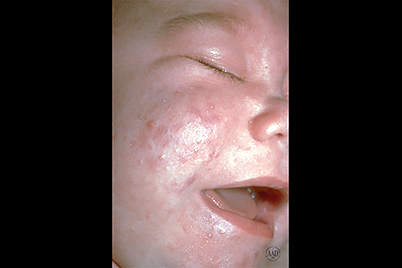Is that acne on my baby’s face?

Newborn acne is generally nothing to worry about
About 20% of newborns have a type of acne called neonatal acne. You’ll usually see it at about 2 weeks of age. However, it can develop any time before 6 weeks of age. Sometimes, a baby is born with acne.
If your newborn has acne, you’ll usually see breakouts on your baby’s cheeks and nose. Acne can also appear on a baby’s forehead, chin, scalp, neck, back, or chest.
Neonatal acne is generally nothing to worry about. It rarely causes a scar and tends to go away on its own in a few weeks to months.
Acne is more worrisome after 6 weeks of age
When acne develops after 6 weeks of age, it’s called infantile acne. This type of acne is likely to begin between 3 and 6 months of age.
If your baby develops acne after 6 weeks of age, you’ll want to see a board-certified dermatologist or pediatric dermatologist. This can be helpful for several reasons. You can:
Make sure it’s acne.
It’s less common for acne to begin in a baby after 6 weeks of age, so you want to make sure your child really has acne. Other skin conditions can look like acne. Your child could have a skin infection or eczema.Rule out something going on inside your child’s body.
When acne begins after 6 weeks of age, it can be a sign of a health problem. A skin exam and sometimes a blood test or x-ray is needed to rule this out.Find out if a skin care product is causing the acne.
Some babies get acne from an ointment or oil that’s found in products used on their skin.Prevent permanent acne scars.
While newborn acne rarely causes a scar, infantile acne can cause permanent acne scars. A dermatologist can help prevent scarring.
While a dermatologist should examine a child who develops acne after 6 weeks of age, this type of acne often clears on its own. Clearing usually takes about 6 months to 1 year. Some children, however, have acne for a longer time. It’s possible for acne to continue through the teen years.
Baby skin care
Never apply acne treatment to your baby's skin unless a dermatologist recommends it.

Caring for acne on your baby’s skin
If your baby has acne, dermatologists recommend that you:
Never put acne medicine or acne wash on your baby’s skin, unless your child’s dermatologist or pediatrician recommends it.
Be very gentle with your baby’s skin, and avoid scrubbing the acne.
Wash your baby’s skin with lukewarm (not hot) water.
Stop using any oily or greasy skin care products.
A dermatologist can tell you when to treat your baby’s acne
Seeing acne on your baby’s skin can be worrisome. A dermatologist can tell you whether you need to treat it. When acne requires treatment, you can rely on a dermatologist’s expertise to treat your baby safely.
Images
Image of newborn acne used with permission of the American Academy of Dermatology National Library of Dermatologic Teaching Slides.
Image of baby being bathed, Getty Images
References
Eichenfield LF, Krakowski AC, et al. “Evidence-based recommendations for the diagnosis and treatment of pediatric acne.” Pediatrics. 2013;131 Suppl 3:S163-86.
Serna-Tamayo C, Janniger CK, et al. “Neonatal and infantile acne vulgaris: An update.” Cutis 2014;94(1):13-15.
Zaenglein AL and Thiboutot DM. “Acne vulgaris.” In: Bolognia JL, et al. Dermatology. (second edition). Mosby Elsevier, Spain, 2008:500.
Last updated: 9/12/23
 Atopic dermatitis: More FDA-approved treatments
Atopic dermatitis: More FDA-approved treatments
 Biosimilars: 14 FAQs
Biosimilars: 14 FAQs
 How to trim your nails
How to trim your nails
 Relieve uncontrollably itchy skin
Relieve uncontrollably itchy skin
 Fade dark spots
Fade dark spots
 Untreatable razor bumps or acne?
Untreatable razor bumps or acne?
 Tattoo removal
Tattoo removal
 Scar treatment
Scar treatment
 Free materials to help raise skin cancer awareness
Free materials to help raise skin cancer awareness
 Dermatologist-approved lesson plans, activities you can use
Dermatologist-approved lesson plans, activities you can use
 Find a Dermatologist
Find a Dermatologist
 What is a dermatologist?
What is a dermatologist?